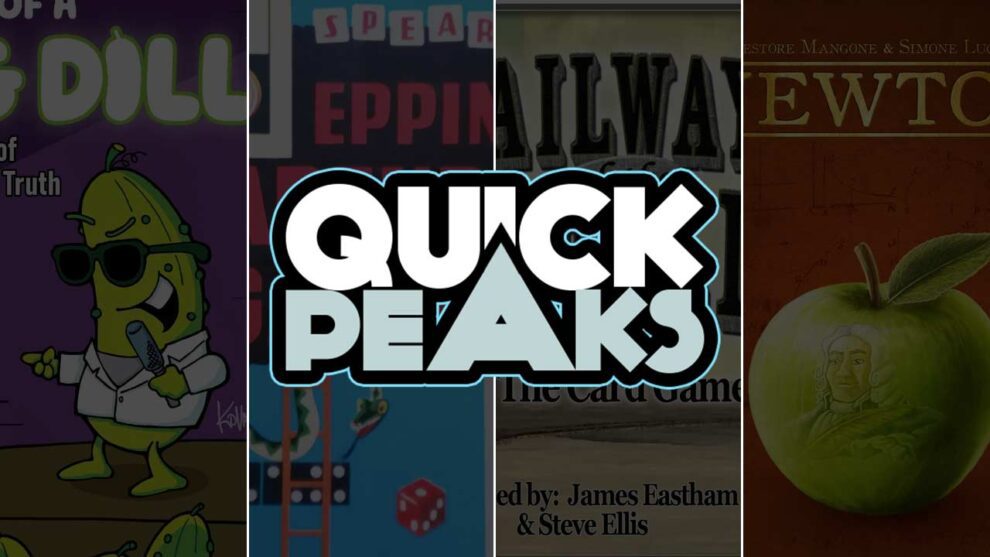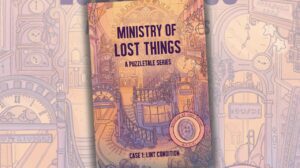Ludos: Ancient Games of Asia – Andrew Lynch
The Ludos series, which collects traditional abstract games from all over the world and presents them in an aesthetically attractive, affordable box, is a wonderful idea. The first volume, Asia, includes hasami shogi from Japan, bagh chal from Nepal, jarmo from Mongolia, and yut from Korea. Each comes in a box-within-the-box, with wooden pieces and high-quality fabric boards. This presentation begs for travel. The games themselves are closer to nine men’s morris than they are chess, relatively simple forebears of juggernauts like shogi and go, but I don’t think “hours of bottomless gameplay” is what this project is about. For those who are interested in the history of board games, it’s invaluable. Ludos is also the second game I’ve played in my time at Meeple Mountain that should, I think, be included in every classroom.
Ease of entry?
★★★★★ – No sweat
Would I play it again?
★★★☆☆ – Wouldn’t suggest it, but would happily play it
Read more articles from Andrew Lynch.
Railways of the World: The Card Game – Justin Bell
“Uh-oh,” my son said when he saw the game box I was about to open. “That one looks like another BTG.” At my house, my kids like to refer to all 18xx, train games, and “cube rail” route-building games that look dry as “Boring Train Games.” And it’s easy to see why my son looked at the box art for Railways of the World: The Card Game (2010, Eagle-Gryphon Games) and thought it might be a bit dry.
But in practice, Railways of the World: The Card Game does a great job of emulating some of the best elements from the base game, all in a system that doesn’t require money to complete actions. Here, there is no board; all track, cities, and delivery elements are delivered via cards that are used to build out a somewhat massive table space over the course of the game. Players use a hand of cards (made available via a three-card common market, top-decking, or drawing cards from a face-up discard pile) to add new cities that are then supplied with cubes in one of four colors. Finding a path for delivery of these cubes, while also scoring points for building each new route, provides in-game scoring opportunities. At the end of the game, players score additional points for sets of cubes delivered, the size of their delivery engine, and building the biggest track route out of each city location.
I liked this variant quite a bit, although our recent three-player game came with a major caveat. Building track is only possible when adding a new city card from hand with the appropriate track cards. That means that if you don’t have city cards, you can’t build, and that left one of our players top-decking cards and not finding city cards for a good stretch of our game. Without city cards, there’s not nearly as much to do, and not nearly the number of ways to score. Because existing cities cannot be connected by only using track, that left a decent-sized hole in my feelings about the design. Otherwise, this is snappy fare and can be played in about an hour, making Railways of the World: The Card Game a good pick for introducing the system to new players.
Ease of entry?
★★★★☆ – The odd bump or two
Would I play it again?
★★★★☆ – Would like to play it again
Read more articles from Justin Bell.
Newton – Andy Matthews
Even though I love board games, and I’m deep into the hobby, “heavy” games are still just a bit outside my comfort zone. It’s usually a mix of layers upon layers of mechanisms, requirements, and the need to keep a long running strategy in your head. I can do it, I just prefer shorter, less complex games. So imagine my surprise when I read about Newton (named after Sir Isaac Newton), and determined that it sounded interesting enough to buy it.
In Newton, players take the role of scientists, traveling around the world, leading their students in making scientific discoveries, all in a tidy 30 rounds (5 turns over 6 rounds). Newton has a “point salad” vibe, which means you’re getting points for just about every action you do. You’ll be able to perform one of 5 different main actions on each turn, along with a few different side actions.
Newton has a lot of nifty mechanisms that come together to form a delightful mélange of long term planning, tactical decisions, and a dash of luck. I’ll just say that even though we finished our game at 11:30pm, we were really close to resetting the board and starting another game immediately. If you enjoy exercising your mental muscles, Newton might be a good choice for you.
Ease of entry?
★★★★☆ – The odd bump or two
Would I play it again?
★★★★★ – Will definitely play it again
Watch our review of Newton.
Read more articles from Andy Matthews.
I’m Kind of a Big Dill – Kevin Brantley
Some may instantly recognize this game as the work of Grant Lyon, a popular content creator in the board game space. You might even spot him at conventions thanks to his unmistakable look—moustache and glasses in tow. This party game was inspired by his love of improv comedy in the clubs of L.A. Add a coat of pickle-themed humor and artwork from the legendary John Kovalic, and you’ve got yourself a pub-worthy game night, brought to you by Left Justified Studio.
Described by some as Wavelength meets improv, this game has players draw a prompt card along with a pickle chip, which tells them how much to over- or under-exaggerate their ability to do whatever’s on the card. Some examples include describing your “ability to tap dance,” “knowledge of Area 51,” or “grasp of time travel theory.” The randomly drawn chip ranges from -3 to +3 (zero included), and that number fuels an improv performance that the rest of the table must decipher. Additionally, the scale is relative to your real-life ability. If players guess the number exactly, they score points, and the “Big Dill” earns points if some players get it right, but not all. You can also double down for extra points… or walk away with nothing. Scores are tracked on adorable pickle-shaped dry erase boards, complete with punny pickle illustrations.
The fun really depends on who you play with. I played with some quick-witted groups and others who struggled to bend the truth. Players are allowed to ask one question to the Big Dill to help generate more material, leading to some great back-and-forth. One prompt was “knowledge of family history,” and the Big Dill immediately roleplayed as my father, but didn’t know my birthday or where I was born. I asked if he knew my wife’s name, to which he replied he didn’t even know I had a wife. Safe to say he was a -3 on the scale.
Overall, the game is fine. It delivers some genuine laughs, especially when players lean into the absurdity. I’d recommend it for fans of improv-style party games or anyone who enjoys a bit of performative flair. While the box includes a generous stack of prompt cards, they’re hit or miss when it comes to “fun potential.” One round had someone describing their ability to wash dishes on a zero scale, which didn’t exactly bring down the house. And by the end of the night, most players weren’t clamoring for another round. Some also had trouble wrapping their heads around what it means to over- or under-exaggerate, which led to a bit of confusion.
The game offers several expansions to spice things up, including Holidays, After Dark, and Nerdy, each with its own themed pickle art on the new score trackers, which I loved.
I’d recommend giving a few prompts a try to see if this briny party game and improv dill fit your group’s taste.
Ease of entry?:
★★★★☆ – The odd bump or two
Would I play it again?:
★★☆☆☆ – Would play again but would rather play something else
Read more articles from Kevin Brantley.












